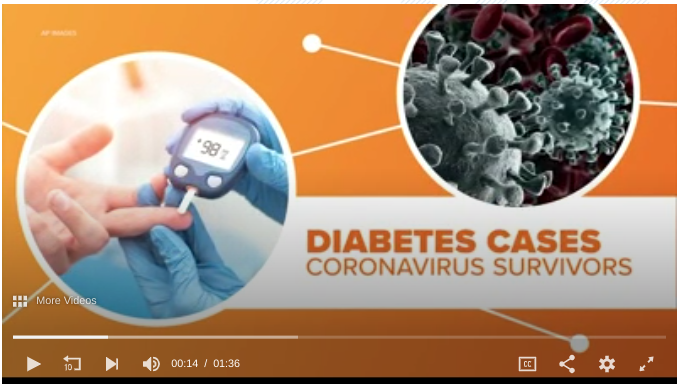Featured image is a screenshot from the video “Can severe COVID-19 cause diabetes?”
165,913,537. That is the number of confirmed COVID-19 cases worldwide, and about 14% of those people now have diabetes, neurological problems, blood clots, and heart damage. Studies have shown that people with diabetes, and heart conditions are at a higher risk for COVID-19 than most people. However, people that are experiencing COVID-19 are now getting diagnosed with diabetes, heart conditions, blood clots, and even neurological problems. In my video, it will talk about the statistics and the breakdown of what people and experts believe is happening and what they think is causing this. However, they do believe that there is no link between COVID-19 and other health problems. But they do believe that COVID-19 is causing a new, never-discovered type of diabetes. There is a theory that people who experienced severe COVID-19 are soon after experiencing symptoms and getting diagnosed with diabetes, heart problems, neurological problems and even blood clots. But how do they know if the two link?
Marcelino Benito (0:10)
Marcelino Benito is the expert in my video. Marcelino Benito is a TV reporter, and he was named the Best TV Reporter in 2016 by the Texas Associated Press. He is a very credible expert and he gives accurate information and many different statistics to prove what he is saying. Marcelino Benito’s work has gotten him two regional Edward R. Murrow Awards and two Rocky Mountain Emmy nominations for feature reporting and also for reporting on the US – Mexico border. Marcelino Benito has worked at KHOU for over 3 years, and during that time he has won two Lone Star Emmy Awards for general assignment reporting and has been honored with first place Texas Associated Press awards in back-to-back years for deadline editing. Because of all the awards that Marcelino Benito has received and been nominated for I think that gives us all the information that we need to know that he is a credible source.
“Severe COVID-19 diabetes diagnosis” (0:24)
At this point in the video it is explaining to us that many people who have had severe COVID-19 are now experiencing other health conditions once they start to recover. The claim being stated is telling us one major health condition that many people are experiencing after having severe COVID-19. In the article I read about COVID-19 and diabetes it states that in November of 2020 they had found that over 14% of COVID-19 patients had now become diagnosed with either type 1 or type 2 diabetes after they had recovered from COVID-19. This fact and the publisher of this website are both very credible sources. Asher Jones was the author of this article and she is a science journalist in Arlington, Virginia, and she is The Scientist’s editorial intern. She has a PhD in entomology from Penn State University. Throughout the article she took claims from experts like Francesco Rubino who said, “The relationship between COVID-19 and diabetes is very complex… it might involve more than one issue.” She also used another expert, Remi Rabasa-Lhoret who says, “we clearly see people without previous diabetes.. It is highly probable that COVID-19 is triggering the disease.”
Over 14% of people who experienced severe COVID-19 develop diabetes (0:41)
Right after they had explained different health conditions people are experiencing after having COVID-19, they had started to get more into the statistics. 14% may not seem like a lot, but when there are 7 billion people on this earth it is actually a lot. Some people believe that those who are getting diagnosed with diabetes and other health conditions after having COVID-19 had pre-existing symptoms, but never caught on in time to catch it before they had COVID-19. However, from this article I read about Can COVID-19 cause diabetes? There was a statement made saying, “We should not dismiss the possibility that SARS-CoV-2 can cause diabetes, but we should not contrive it out of thin air if it is not supported by evidence, either.” Another thing stated in this article was that “[w]e should continue to monitor the possibility that secondary diabetes is a distinct clinical entity within ‘long COVID’, and we should encourage people with diabetes to get vaccinated.” These facts and the publisher are both really credible sources. Domenico Accili is the author of this article and he is a part of the Department of Medicine and Naomi Berrie Diabetes Center, Vagelos College of Physicians and Surgeons of Columbia University, New York, NY, USA. Domenico Accili did not use any other experts in his article, he wrote his article strictly on what he knows and what other scientists have discovered.
“No direct link proven” (0:49)
After explaining the statistics of how many people have been diagnosed with diabetes and other major health conditions after experiencing COVID-19, they tell us how there is no link or evidence to prove that COVID-19 is causing these medical conditions. However, scientists are trying to prove the correlation between the two. Just like diabetes, many people are having neurological problems. In an article I read about, How COVID-19 can damage the brain, there was a statement made from expert Benedict Michael. He said, “We’ve seen this group of younger people without conventional risk factors who are having strokes, and patients having acute changes in mental status that are not otherwise explained.” These facts and the publisher are both very credible sources. This article was written by Michael Marshall, who is a science writer based in Devon, UK. He used experts like Alysson Muotri who is a neuroscientist at the University of California, San Diego, in La Jolla. She says that, “The neurological symptoms are only becoming more and more scary.” He also used Benedict Michael who is a neurologist at the University of Liverpool, UK. He states, “That’s why the disease mechanisms are so important.” Another expert that he used is Michael Zandi who is a neurologist at University College London and a lead author on this study. He says, “This was the brain being hit as their main disease.” He also used Fernanda De Felice who works at the Federal University of Rio de Janeiro in Brazil. She says that there could be “more than 50%” of people who have experienced neurological symptoms after having COVID-19. The last expert that he used was Mary Fowkes who is a pathologist at the Icahn School of Medicine at Mount Sinai in New York City, and she says that “[w]e’re simply not seeing the virus involved in the olfactory bulb.”
They are questioning if COVID-19 is causing a new type of diabetes that nobody has ever heard of before (1:13)
At this part in the video they are explaining to us the different types of diabetes and what causes them. They think that COVID-19 may be causing a new type of diabetes, but instead of it working like type 1 and type 2 diabetes, they think it will work completely differently. However, they do not know if this is the actual case or if it will be a permanent thing and last a long time. They also don’t know if these people who are getting diagnosed with diabetes will have it forever. We all know that COVID-19 attacks the lungs, but it has recently been starting to be associated with other medical conditions like blood clots, neurological problems, and heart damage. Now, studies show that diabetes may be a new addition to this list. However, still a year has passed and scientists have not been able to prove the link between COVID-19 and diabetes. John Kunkel is an example of COVID-19 causing diabetes. John Kunkel is a 47-year-old banking executive in Evening Shade, Ark, and his case had shown up unexpectedly and was a surprise to him and many others. He ended up being hospitalized in early July of 2020 and when he had his follow up appointment with his doctor they noticed his blood glucose levels were so said, “dangerously high”, and John was then readmitted to the hospital and was told he had type 2 diabetes. In response to this John said that he “had no pre-existing health issues”, and that he was “blown away” and wondering “Why?” After this journey for John he had lost his job because of this unexpected turn on his road of recovery from COVID-19. And he questioned if he “would ever get [his] life back” and nobody knew.
The publisher and facts in this article are very credible sources. This article was written by Erin Blakemore who is a Journalist, historian, and an editor, she mainly writes about science and history topics. She used experts like Mihail Zilbermint, who is the head of a special team that cares for patients with the metabolic disorder at Suburban Hospital in Bethesda, Md. Zilbermint says that, “We’ve definitely seen an uptick in patients who are newly diagnosed”. She also used an actual patient who had experienced diabetes after COVID-19. She also used the expert Francesco Rubino, who is a diabetes surgery professor at King’s College London, and he is convinced that there is some type of connection between COVID-19 and diabetes. Rubino says that “[t]here’s a good chance that the mechanism of the diabetes isn’t typical” and that “[t]here could be a hybrid form. It’s concerning.” Another expert she used was Katie Colbert Coate who is a diabetes researcher and research instructor in medicine at Vanderbilt University Medical Center. She says that “[i]f scientists could figure out how or if viral infection can damage beta cells, or what role viruses play in the development of the disease, it would be a real turning point.” She also used Senta Georgia who is an investigator in the hospital’s Saban Research Institute. Georgia states that, “Only with the scientific public square can we put all of this data out there, evaluate its strengths and weaknesses… until we really get the information we need.” The final person that Blakemore used was Tanisha Flowers who was a newly diagnosed nurse practitioner. She stated that “[she isn’t herself] anymore” and that, “No one knows what the lasting outcomes are.”
165,913,537. The number of people who have experienced COVID-19. Doctors and scientists are trying to figure out the link between COVID-19 and diabetes, neurological problems, blood clots and heart damage. Doctors are now pushing people to get vaccinated and pay attention to symptoms they have during recovery from COVID-19. Most importantly, they are pushing to find what is causing these people who experience severe COVID-19 to be newly diagnosed with other medical conditions, or even if it’s just solely the fact that people have had these symptoms before COVID-19 and are just now getting diagnosed.

